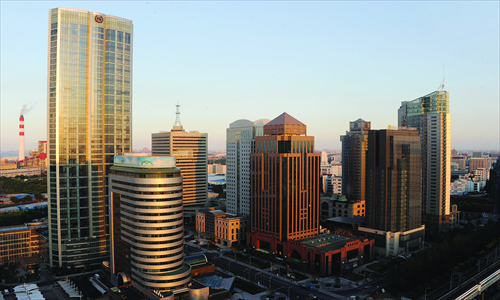Firewall not the issue as trade zone opens

The Waigaoqiao Free Trade Zone in Shanghai, which will be included in the new Shanghai free trade zone Photo: CFP
According to a South China Morning Post report, the upcoming Shanghai free trade zone will lift the Internet filter.
This report quickly made this alleged special Internet policy a hot topic in public opinion.
People are starting to shift their attention from the economic pioneering of this free trade zone to a possible Internet or cultural "special zone." However, such discussions will probably turn out to be unproductive assumptions.
There is no doubt that the free trade zone, which is supposed to be started soon, is a special economic zone. It is also possible that Internet access will enjoy more openness within the zone.
However, it should be noted that such open Internet access is nothing that deserves overwhelming attention, because it is designed to facilitate the international business environment within the zone.
The firewall on Chinese Internet service should be seen as a precaution that China takes to deal with the complicated cyberspace so that the nation's security can be guaranteed. This is not a choice based on values but reality.
We should foresee that although the firewall still has vitality, social development and the increase in national confidence will gradually weaken the effect of such a firewall.
The firewall will then become part of the past of the development of China's Internet.
If the lifting of the firewall can be achieved technologically, then a gradual liberalization of Internet access is not a political issue.
We believe that if the Shanghai free trade zone decides to lift the ban on overseas social media sites, including Facebook, it should be based on actual demand, not public opinion.
There are various requirements raised on the Internet over the issue, but the government cannot run on the reaction of the Internet. Otherwise, the country is building a fragile future.
Shanghai free trade zone covers an area of 28 square kilometers. The business and trade activities with more free market distinction will inevitably cast an influence over other facets of life there, including experiments in other fields. This should happen naturally.
Right now, given the severe polarization of public opinion in China, if the planning and implementation of the Shanghai free trade zone gives too much way to social opinion, the progress of it will be seriously hindered.
As an important new economic initiative for China's next decade, Shanghai free trade zone is hoped to bring momentum for China's next round of economic growth.
Compared with confusion and obstacles faced by building special economic zones, such as Shenzhen three decades ago, the attention given to the firewall doesn't deserve a fuss. We wish Shanghai free trade zone good luck.
Daily special: Shanghai free trade zone testing ground for reform